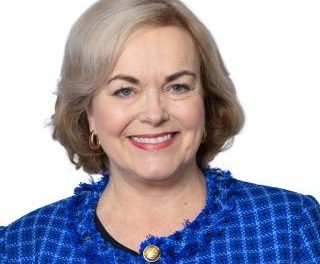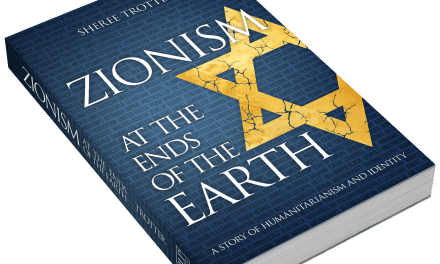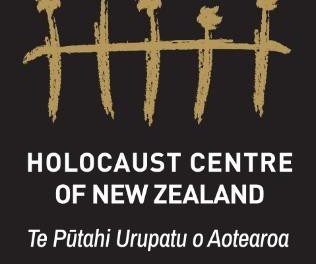It’s been a long, hard year, and the summer holidays offer a chance for respite.
Traditionally, New Zealand closes down for the Christmas break. And that makes for a few weeks to relax and catch up on some reading.
But this year rather than recommending a selection of new books from current bestseller lists, or critics picks, the One Community Chronicle has taken a different approach.
Recent years have seen the publication of a series of fascinating, powerful and inspiring memoirs by, and biographies of Jewish New Zealanders.
We think it’s worth highlighting this literary trend, so here’s a selection of those books for your reading pleasure.

Resilience: A Story of Persecution, Escape, Survival and Triumph (by Inge Woolf)
Resilience is a Holocaust story and a New Zealand story.
Born to a prosperous family, Inge Woolf witnessed the Nazis marching into Vienna in March 1938 and fled with her family to England, escaping certain death. Hiding their Jewish identity until after World War II, Inge and her family were impoverished refugees.
A move to New Zealand signalled new beginnings. Inge met the love of her life, Ronald Woolf, and together they created the country’s pre-eminent photographic studio – before catastrophe struck.
In her later years, Inge was pivotal in establishing the Holocaust Centre of New Zealand and was its founding director. She was dedicated to educating thousands on the Holocaust and the dangers of racism and prejudice, often observing that hate start small.
After experiencing so much loss, Inge’s life was a testament to the power of resilience.
Read more about Inge Woolf’s memoir here and here.
“Resilience: A Story of Persecution, Escape, Survival and Triumph” was published in April 2023. It is available from the Holocaust Centre at https://www.holocaustcentre.org.nz/store/p19/Resilience.html, and also at booksellers around the country.
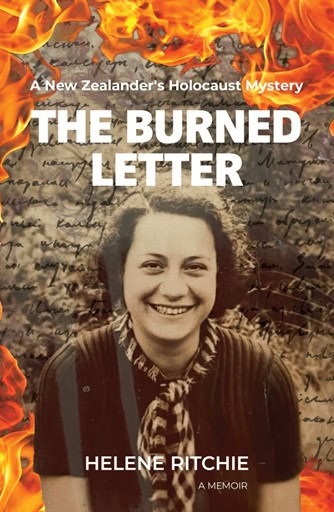
Burned Letter: A New Zealander’s Holocaust Mystery (by Helene Ritchie)
“Every day, I am in Auschwitz,” Lidi, Helene Ritchie’s mother would say. Even though she never had been. During the Holocaust, Lidi, as a teenager, flees from Hitler and the Nazis.
Forced to leave behind everyone whom she loves, she eventually arrives in New Zealand as a Jewish refugee, with her mother. Alive in their new country, but labelled again, they immediately are called ‘enemy aliens’, monitored by the police, their letters censored, their lives and movements restricted.
Five years later in 1945, a few months after the liberation of Auschwitz, Lidi burns the letter written to her that tells her what happened to those she loved most dearly. She hopes that in turning the letter to ashes, her survivor guilt and trauma would disappear too.
But her efforts are in vain. “They – all those relations – just perished,” Lidi says over and over again. Nearly 70 years later, just before she dies at the age of 92, Lidi said she regrets burning the letter. Too late.
“They” remain a mystery to Helene, Lidi’s daughter. As does their fate.
For 50 years, she travels the world, searching for her grandparents and her “just perished” family. It was as if “they” all just disappeared in a puff of smoke. But she does find traces in the killing centres, ghettos and death marches across Poland, Czechoslovakia and Germany, discovering murder, suicides, theft, and tragic love affairs.
Read more about Helene Ritchie’s book here and here.
“The Burned Letter” was published in June 2023, and is available at booksellers around the country.
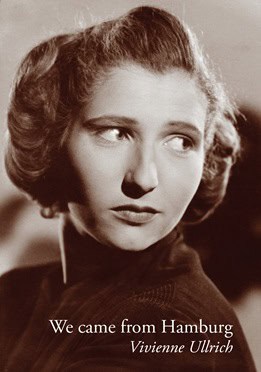
We Came from Hamburg (by Vivienne Ullrich)
It is Hamburg, 1920. Abruptly Erna leaves her marriage and her three daughters, and disappears from the family. No one speaks of her again. One by one the other members of the Simon family begin to disappear, with death from natural causes and then as a response to what is happening in Germany with the rise of the Third Reich. The family is Jewish, they cannot stay.
During the war, what appears to be the remnant of the Simon family finds its way to New Zealand to start a new life. There are three: Wally, Liesl and Eric. Time passes and the family grows. Then one day an email arrives.
“We Came from Hamburg” is a story of secrets, persecution and escape, and the elation of finding people half a century later who share a story you thought had been left behind.
Listen to an interview with Vivienne Ullrich on Radio NZ here, and read a review on GoodReads here.
“We Came From Hamburg” was published in December 2022, and is available at booksellers around the country and online.
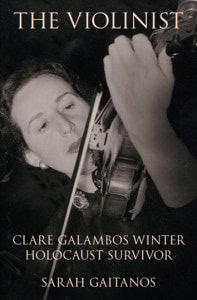
The Violinist (by Sara Gaitanos)
Klára Galambos (1923 – 2014) was a twenty-year-old violin student in Budapest in March 1944. Arrested and thrown into jail in the first days after the German occupation, she later managed to get home to Szombathely, was in the ghetto there and transported with the Jews of Szombathely to Auschwitz Birkenau.
After five weeks she and her aunt were among the thousand Hungarian women selected for slave labour at Allendorf. They returned to Hungary after the war, and in 1948 they both left Hungary for New Zealand, where Clare joined the fledgling national orchestra.
As a long-serving member of the NZSO, she made a significant contribution to the musical life of this country. Clare passed away in 2014 and is buried in a Wellington cemetery. The Violinist draws on memoir, interviews and historical research to tell a compelling story.
Read more about Klára Galambos here and here.
“The Violinist” was published in 2011, and is available from the Holocaust Centre at https://www.holocaustcentre.org.nz/store/p7/The_Violinist:_Clare_Galambos_Winter_-_Holocaust_Survivor.html.
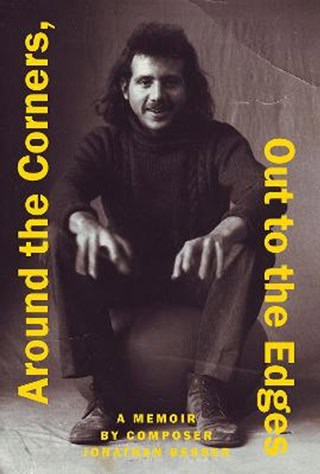
Around the Corners, Out to the Edges: A Memoir (by Jonathan Besser)
Acclaimed classical music composer and director Jonathan Besser’s career was colourful and experimental, immersed in the burgeoning New Zealand art scene of the 70s and 80s.
Born into a Jewish household in New York in 1949, Jonathan struggled in school as a neuro-atypical child, before delving into music with single-minded zeal.
After studying composition at Mannes College of Music, on a whim he went into the Australian immigration office, and was promptly redirected across the hall to the New Zealand office. One can only imagine the culture shock of moving from a New York music school to New Zealand in the 1970s.
From the gritty student flats of Grafton, to living as an unemployed composer in Wellington and working as a Dunedin postie, in this memoir published just after his death Jonathan offers a fascinating perspective on New Zealand’s cultural heritage via vivid, lively stories.
Travelling widely, and collaborating with the likes of Billy Apple, Whirimako Black, Warwick Broadhead, Jon Cells, Marti Friedlander, Don McGlashan, Gaylene Preston and Ian Wedde, Jonathan describes the oscillations of life as an artist… From impoverishment to sought-after director and composer across a strikingly broad range of disciplines, including poetry, theatre, film and television, painting, ballet and opera, as well as classical and avant-garde music.
Jonathan’s memoir leads us entertainingly through a career of music-making in a country that warmly welcomes the unconventional.
Read more about Jonathan Besser’s memoir here, here and here.
“Around the Corners, Out to the Edges” was published in April 2022, and is available from online booksellers, such as Fishpond, Mighty Ape and Amazon.
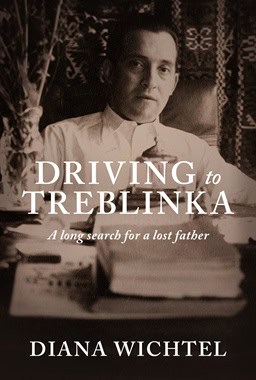
Driving to Treblinka: A Long Search for a Lost Father (by Diana Wichtel)
Diana Wichtel was born in Vancouver. Her mother was a New Zealander, her father a Polish Jew who had jumped off a train to the Treblinka death camp and hidden from the Nazis until the end of the war. When Diana was 13 she moved to New Zealand with her mother, sister and brother. Her father was to follow.
Diana never saw him again.
Many years later she sets out to discover what happened to him. The search becomes an obsession as she painstakingly uncovers information about his large Warsaw family and their fate at the hands of the Nazis, scours archives across the world for clues to her father’s disappearance, and visits the places he lived.
This unforgettable narrative by respected New Zealand journalist Diana Wichtel is also a deep reflection on the meaning of family, the trauma of loss, and the insistence of memory. It asks the question: Is it better to know, or more bearable not to?
Read more about “Driving to Treblinka” here and here, and listen to Diana Wichtel’s interview with Kim Hill on Radio NZ here.
“Driving to Treblinka: A Long Search for a Lost Father” was published in September 2017, and is available at booksellers around the country and online.
And finally, for a broad overview of notable and influential Jewish New Zealanders who have made their mark on the country, check out a copy of…
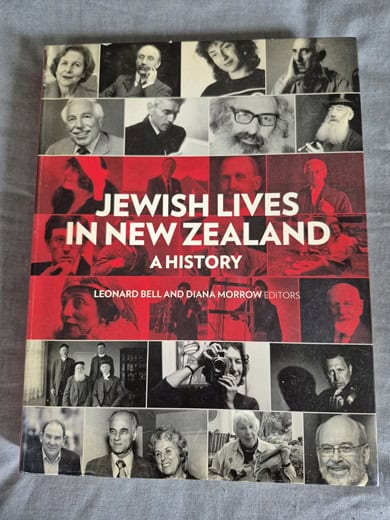
Jewish Lives in New Zealand (edited by Leonard Bell and Diana Morrow)
The census tells us that 8000 New Zealanders actively identify as Jewish and it is estimated that the broader population is probably around 25,000.
Prior to the publication of this book, there had never been an authoritative history of this country’s Jewish population and yet people of Jewish descent (both secular and religious) have played vital roles in all aspects of our society throughout its history.
Auckland alone has had five Jewish mayors. Jews have been prominent in New Zealand’s business, cultural, intellectual, political, medical, intellectual life and more since the 1840s, and successive waves of immigration have added to the tapestry of New Zealand Jewry.
This significant book covers key sectors of activity with specialist writers assigned to each. Richly illustrated, it slots another important piece into the jigsaw of our history.
Read more about “Jewish Lives in New Zealand” here, and listen to a Radio NZ interview with co-editor Leonard Bell about it here.
“Jewish Lives in New Zealand” was published in 2012, and is available from online booksellers, such as Amazon, Fishpond and Hard to Find Books.


